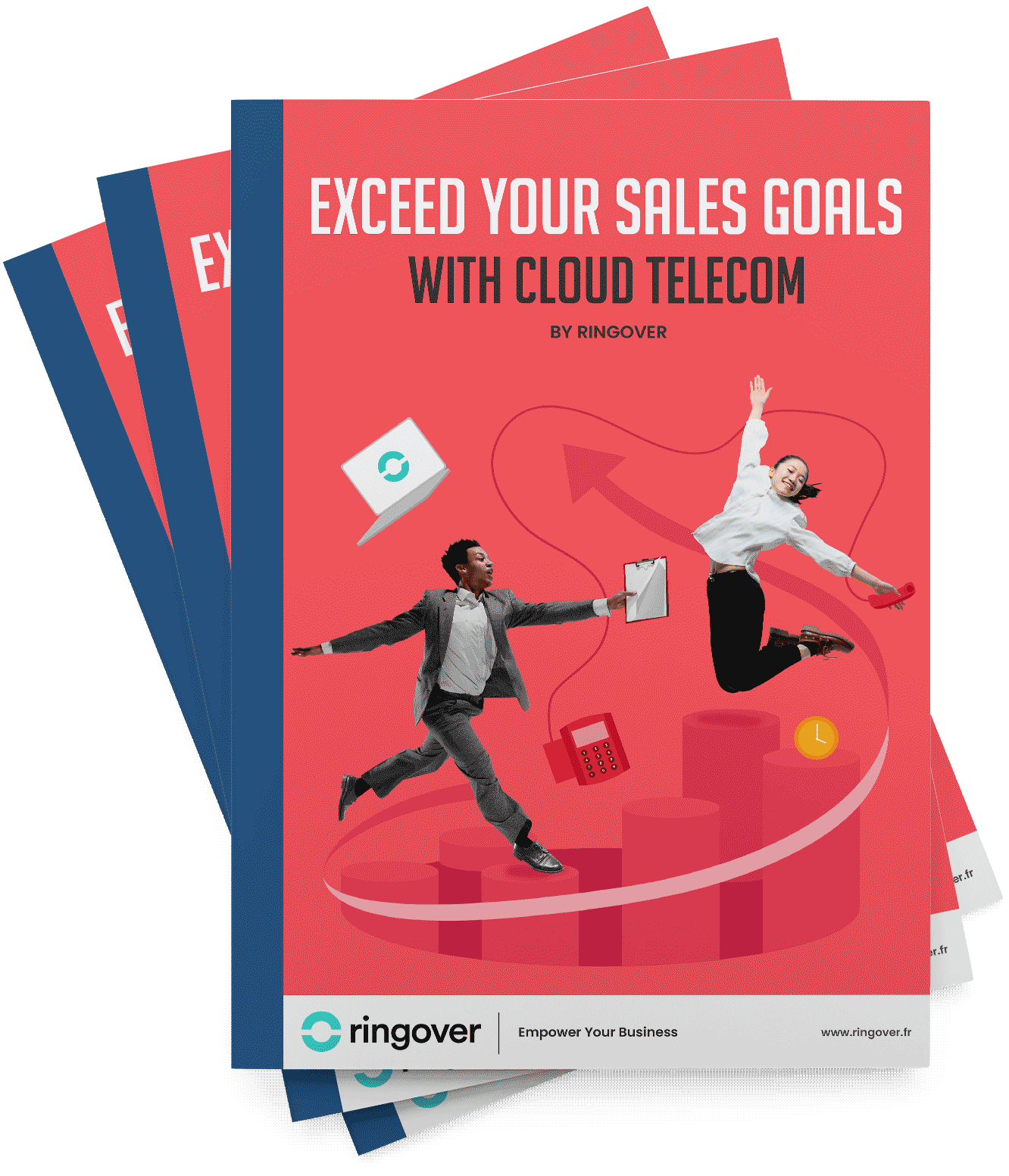Summary
- What Is a Call Center Agent?
- What Does a Call Center Agent Do? Key Duties and Responsibilities
- The Different Types of Call Center Agent Jobs
- Essential Skills for a Successful Call Center Agent
- What's It Like Working as a Call Center Agent?
- Concluding Thoughts on Call Center Agents
- Call Center Agent FAQ
- Citations
A call center agent is a crucial front-line role for any business that values customer interaction. As the primary point of contact for customers, these professionals have a direct impact on customer satisfaction, loyalty, and the company's overall reputation. This article provides a comprehensive overview of the call center agent's job, including their primary duties, responsibilities, the skills required to succeed, and the different types of roles available.
Free Trial: Ringover's Call Center SoftwareWhat Is a Call Center Agent?
A call center agent, often called a customer service representative (CSR), is an employee who handles inbound and outbound customer communications for a business[1]. Their main function is to serve as the voice of the company, assisting customers with their inquiries, complaints, and support needs.
While the term "call center agent" is still widely used, many of these professionals now work in modern contact centers. Unlike traditional call centers that only handle phone calls, contact centers manage customer interactions across a wide range of channels, including email, live chat, and social media via call center software. This evolution toward multichannel communication reflects the changing ways customers prefer to communicate with businesses. Advanced contact center software solutions integrate these channels into a single platform, giving agents a complete view of the customer's journey.
What Does a Call Center Agent Do? Key Duties and Responsibilities
The daily tasks of a call center agent are varied and depend on their specific role, such as whether they handle inbound, outbound, or a mix of both types of communications.
Handling Inbound and Outbound Communications
The two primary types of call center agents are inbound and outbound[3]. Each has distinct duties.
Inbound Agent Duties:
- Answering customer calls for assistance.
- Assisting with product or service questions, processing new orders, and resolving billing issues.
- Providing technical support and troubleshooting problems to find a resolution.
Outbound Agent Duties:
- Placing calls to potential or existing customers.
- Conducting telemarketing or using a lead generation platform or sales call software.
- Carrying out customer satisfaction surveys and collecting market feedback.
- Setting appointments for sales teams to follow up on.
Ensuring a Positive Customer Experience
A core responsibility for every call center agent is to deliver a positive customer experience through professional and helpful interactions[4]. This directly influences customer satisfaction and retention.
Key responsibilities include:
- Actively listening to understand customer needs, questions, and concerns.
- Resolving complaints efficiently and escalating complex issues to a supervisor when necessary.
- Following communication and sales scripts to maintain a consistent and compliant standard of service.
- Personalizing interactions by accessing the customer's history and data through CRM integration.
Administrative and Technical Tasks
Beyond direct communication, a call center agent's role involves several administrative and technical duties. Modern agents rely heavily on technology like cloud-based business phone systems and omnichannel contact center platforms to perform their jobs effectively.
Administrative duties include:
- Keeping detailed and accurate records of all customer interactions and transactions.
- Updating customer information in the company database after each call.
- Identifying opportunities to upsell or cross-sell relevant products and services when appropriate.
Tools like Ringover's call center software help agents manage calls, access customer data instantly, and work more efficiently.
The Different Types of Call Center Agent Jobs
While "call center agent" is often an entry-level position, it serves as a gateway to numerous career advancement opportunities within a contact center. Understanding the different roles is important for effective call center staffing and creating clear career paths for employees.
A typical call center has a clear organizational structure with several key roles[6]. These roles often include[7]:
- Call Center Agent / Customer Service Representative (CSR): The frontline professional responsible for handling direct customer interactions.
- Team Leader / Supervisor: Manages a team of agents, provides ongoing coaching and training, and handles escalated customer calls.
- Quality Assurance Specialist: Monitors and evaluates agent calls to ensure they meet the company's quality standards and compliance requirements.
- Call Center Manager: Oversees the entire operation of the call center, including staffing, strategy, technology, and overall performance.
Essential Skills for a Successful Call Center Agent
To succeed in this role, an agent needs a balanced mix of soft skills (personal attributes) and hard skills (technical abilities).
Key Soft Skills
- Communication: The ability to convey information clearly, concisely, and professionally.
- Patience and Empathy: Understanding customer frustrations and responding with a calm and helpful attitude.
- Problem-Solving: Thinking critically to identify the root of a customer's issue and find an effective solution.
- Composure: Staying calm and professional, especially during stressful or difficult interactions.
- Adaptability: Flexibly handling different types of calls, customer personalities, and unexpected challenges.
Important Hard Skills
- Product/Service Knowledge: A deep understanding of the company's offerings to answer questions accurately.
- Technical Proficiency: Comfortably using call center software, CRMs, and other digital tools.
- Typing and Data Entry: The ability to type quickly and accurately to document call information in real-time.
- Time Management: Handling calls efficiently to meet performance targets like Average Handle Time and First Call Resolution without sacrificing quality.
Using a modern business phone system like Ringover can significantly help agents develop these skills by providing all the necessary tools–from a power dialer to the CRM–in one integrated and user-friendly platform.
What's It Like Working as a Call Center Agent?
The work environment for a call center agent can be both rewarding and challenging. On one hand, many agents enjoy being part of a supportive team and find satisfaction in helping people solve problems. There are often clear opportunities for career growth within the company.
On the other hand, the role can be demanding. Agents must meet strict performance metrics and sometimes deal with difficult or upset customers, which requires a high degree of emotional resilience[8].
The physical environment has also evolved. While many agents still work in-house at a company's office or for an outsourced provider, the rise of cloud technology has made remote work increasingly common. Virtual contact centers allow agents to work from home with the same capabilities as their office-based counterparts.
Concluding Thoughts on Call Center Agents
A call center agent is a dynamic and essential role that is central to a company's customer service operations. The position requires a unique combination of excellent communication, critical problem-solving, and strong technical skills. As the primary ambassadors for the brand, agents are the backbone of customer service and play a direct role in shaping a company's success and public reputation.
With the right tools, training, and a supportive environment, a career as a call center agent can be highly rewarding and offer significant opportunities for professional growth. Those looking to excel can find more useful information and call center tips to help them succeed.
Call Center Agent FAQ
What does a call centre agent do?
A call centre agent handles inbound and outbound calls to assist customers, resolve issues, provide information, or sell products and services. Their responsibilities typically include answering customer inquiries, managing complaints, updating customer records, following call scripts, and ensuring a positive customer experience across phone, email, or live chat channels.
What skills do call center agents need?
Call center agents need strong communication and listening skills, problem-solving abilities, and a high level of empathy. Key skills also include patience, time management, adaptability, basic technical knowledge, and the ability to work with call center software such as CRM and call management systems. Clear verbal expression and emotional control are essential for handling high call volumes.
What is BPO in a call center?
BPO stands for Business Process Outsourcing. In the context of call centers, BPO refers to companies that outsource customer support, sales, or technical assistance to third-party service providers. Call center BPOs manage customer interactions on behalf of other businesses, often across multiple channels and time zones.
Is a call center agent a good job?
Being a call center agent can be a good job, especially for individuals looking to build communication skills, gain customer service experience, or start a career in operations or sales. Many call centers offer flexible schedules, performance-based incentives, and opportunities for career growth into supervisory or management roles.
Can I work in a call center from home?
Yes, many companies now offer remote or hybrid call center roles. Working from home as a call center agent typically requires a stable internet connection, a quiet workspace, a headset, and access to cloud-based call center software. Remote call center jobs provide greater flexibility while maintaining productivity and service quality.
What does it take to be a call center agent?
To be a call center agent, you need strong communication skills, customer-focused behavior, basic computer proficiency, and the ability to work under pressure. While formal education requirements are usually minimal, employers often look for reliability, adaptability, and a willingness to learn new tools and processes.
How do I train myself to be a call center agent?
You can train yourself to be a call center agent by improving your communication skills, practicing active listening, and learning how to handle customer objections and difficult conversations. Familiarizing yourself with CRM systems, call scripts, and basic customer service techniques through online courses or simulations can also help you prepare for a call center role.
Citations
- [1]https://www.ttec.com/glossary/call-center-associate-call-center-agent
- [3]https://www.brightpattern.com/what-are-the-two-types-of-call-center-agents
- [4]https://www.techtarget.com/searchcustomerexperience/definition/call-center-agent-call-center-representative
- [6]https://www.callcentrehelper.com/typical-roles-in-a-call-centre-51389.htm
- [7]https://callcenterjob.org/types-of-call-center-agent-jobs
- [8]https://www.ttecjobs.com/en/what-its-like-working-in-a-call-center-real-experiences-pros-and-cons
Published on February 6, 2026.

